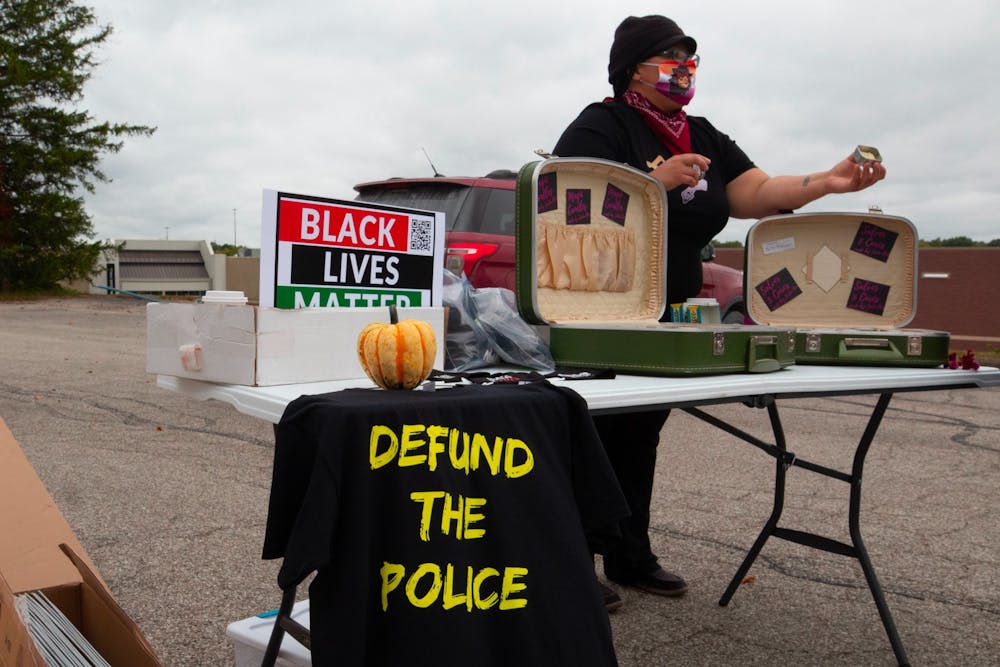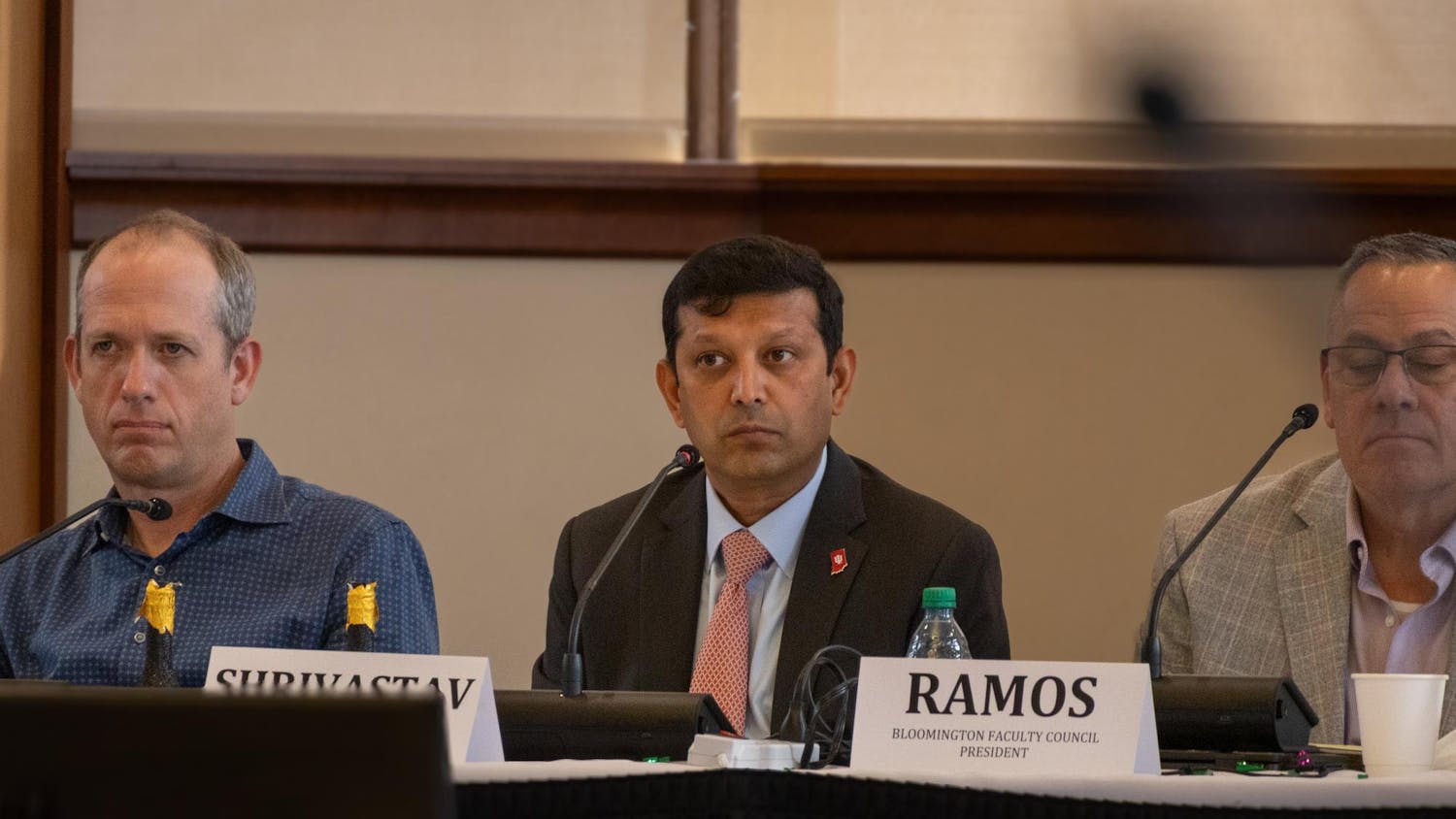Jada Bee, core council of Black Lives Matter B-Town, knew former Minneapolis police officer Derek Chauvin was on trial for the killing of George Floyd, but Bee didn’t seek out updates on the case.
Bee, who uses all pronouns, said she has heard some basic facts on the trial through social media. She didn’t check articles every day because she didn’t want to relive the trauma and was sickened by the contrast between Chauvin and Floyd’s treatment by the justice system.
“He gets the luxury of the American justice system functioning correctly for him,” Bee said about Chauvin. “George Floyd did not get that luxury.”
Chauvin was convicted of second-degree unintentional murder, third-degree murder and second-degree manslaughter Tuesday afternoon. In a text message after the verdict was announced around 5 p.m., Bee said they had not been expecting Chauvin to be convicted based on the presence of the National Guard and military assault vehicles in Minneapolis, but it is a hollow victory because policing still hasn’t changed.
Even if Chauvin were to live the rest of his days in prison, it wouldn’t matter because Floyd is still dead, and, now, so is Daunte Wright, Bee said in a text after the verdict was announced. Wright was a 20-year-old Black man who was shot and killed by another police officer in a Minneapolis suburb on April 11, shortly after Chauvin’s trial began.
“The system is so flawed that a year later Daunte Wright is dead,” she said.
Bee, 41, can’t remember much about the day Minneapolis police officer Derek Chauvin killed George Floyd.
On May 25, 2020, Bee was already overwhelmed. They had just gone into lockdown due to the COVID-19 pandemic when they heard police shot and killed Breonna Taylor in her home in Louisville, Kentucky. About eight weeks later, Dreasjon Reed was shot by police in Indianapolis on a Facebook livestream. And almost three weeks after that, Chauvin knelt on Floyd’s neck for nine minutes and 29 seconds, according to the prosecution.
But on May 25 she does remember reaching out to family members, friends and other members of BLM B-Town, especially those with ties to Minneapolis. Bee, a member of the six-person core council for BLM B-Town, said she talked with people inside and outside the collective. Bee said the core council all came to the same conclusion: The police are still corrupt, even during a pandemic.
Bee said Black Lives Matter B-Town speaks together as an organization with one collective voice. They said the collective does not have a hierarchical structure in which one person represents the group because they themselves are attempting to dismantle those oppressive structures.
“It doesn’t matter who I am, we are speaking as the Black collective, the Black progressive collective known as Black Lives Matter Bloomington,” Bee said. “No one speaks for the group, but all speak as the group.”
As the BLM B-Town collective continued its discussions, Floyd’s death received more national coverage, people sent hundreds of donations and messages to BLM B-Town and protests were growing, Bee’s optimism grew. Maybe this support could turn into something, he thought. Maybe together, BLM and its supporters could dismantle a systemically and institutionally racist system that had killed Black people.
In June 2020, BLM B-Town organized a virtual forum called “Black Against the Wall,” during which topics such as white supremacy, police and protests were discussed. The forum had about 10,000 views on Facebook by December 2020. Bee attended multiple protests in Bloomington. In June 2020, Bee helped establish a new anti-racist farmers market focused on food justice, called People’s Market, in response to the City of Bloomington not removing vendor Schooner Creek Farm. The owner is a self-proclaimed identitarian, which is a movement based on racism and exclusion, according to extremism researcher Brian Levin in an interview to Indiana Public Media.
But in August, Bee saw demonstrations slowing down, support waning and donations to all BLM groups drying up.
They saw people refusing previously sought-after “Black Lives Matter B-Town” signs because they said, “if Black lives matter then defund the police” on the back. She has seen liberal white people in Bloomington fight an ordinance that would have allowed for more protections for homeless individuals.
She has seen members of affluent neighborhoods argue against proposed changes to zoning rules that would allow for more affordable housing in their area. Both zoning changes and protections for homeless individuals would have helped Black people, who are disproportionately affected by homelessness and income inequality, according to the National Alliance to End Homelessness.
Bee is not as optimistic in 2021 about whether the country and white people are capable of hearing and receiving the message of anti-racism.
Bee said she cared about the decision of the jury in Chauvin’s case, though. She wanted him to be convicted and said she was going to be pissed off if he wasn’t.
But even so, she said the fullest extent of justice the current system can provide is not enough because the prison system itself is not just and no real change in policing will have been made.
Following the announcement of the verdict, Bee said in a text they are expecting backlash for this small victory.
“There will be a price for this and my guess is tonight in Minneapolis some other Black person will pay for this in blood or their life either by the police themselves or by the white supremacists who prop them up,” Bee said.
The defense for the Derek Chauvin trial rested its case Thursday morning after two days of questioning witnesses, compared to the prosecution’s two weeks. The judge announced the jury’s verdict at about 5 p.m. Tuesday afternoon after about 10 hours of deliberation.
Chauvin was found guilty of all three counts, which means he could face up to 75 years in prison. However, Minnesota sentencing guidelines recommend between 10 years and nine months to 15 years instead of the maximum sentence of 40 years for second-degree murder, the most serious charge against Chauvin. The maximum 75 years is unlikely — according to the New York Times, the most likely sentence is four years.
Chauvin’s sentence, which is in the hands of the judge since Chauvin waived his right to have the jury decide, will be announced in about eight weeks.
The five weeks of court proceedings included traumatic videos and witnesses who expressed regret for not intervening more when Floyd was pinned to the ground.
“It's been nights I've stayed up apologizing to George Floyd for not doing more and not physically interacting and not saving his life,” testified Darnella Frazier, the teenager who filmed the infamous viral video of Chauvin kneeling on Floyd.
Other Minneapolis police officers also served as witnesses for the prosecution.
Bee said he has heard some of the testimony given by officers and Minneapolis police chief Medaria Arradondo who said Chauvin defied training by applying the level of force he did when Floyd was already laying on the ground with his hands cuffed behind his back. In his testimony, Arradondo said this action was against the Minneapolis Police Department’s policies, ethics and values.
The prosecution cited this testimony as proof that Chauvin murdered Floyd because Chauvin didn’t follow the procedure outlined by the Minneapolis Police Department. This portion of the testimony portrays Chauvin as a bad apple who didn’t follow protocol and implicitly denies any systemic causes for what happened, Bee said.
Bee has heard this argument — the one that claims certain officers, such as Chauvin, are bad apples in a system of mostly good people — from people who do not support defunding the police. It’s an argument that avoids what he said is the root issue: law enforcement is a corrupt system ingrained with institutionalized racism. That root issue has enabled many more officers than Chauvin to racially profile and enact violence against Black people and other people of color, Bee said.
“If he does get the justice he deserves, if he gets what is legally coming to him, it’s a false victory because we still have this corrupt police force all throughout the country who are just going to murder again,” Bee said before the verdict.
It’s not one bad apple, it’s bunches of bad apples, Bee said.
“When you have orchards of rotten fruit and your trees are infested, the only thing to do is to cut them down and burn them,” they said. “You have to cut them down all the way down to the roots and burn every bit of it before you can plant something new because it’s all infested and it will continue to spread if you just try to remove one bad apple.”




